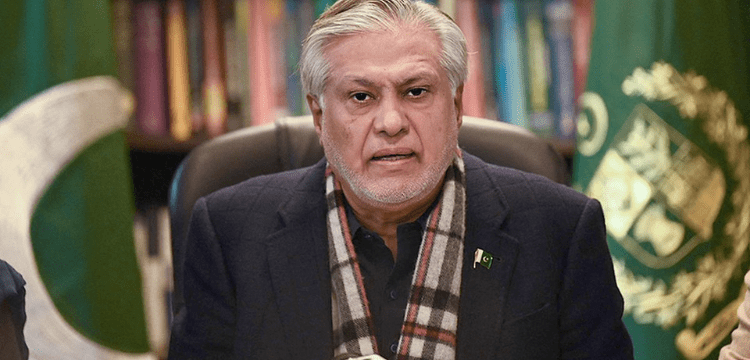[vc_row][vc_column][vc_column_text dp_text_size=”size-4″]ISLAMABAD: In a significant development, Finance Minister Ishaq Dar has cancelled his trip to the United States, where he was scheduled to meet with IMF management to discuss removing bottlenecks in the way of the staff-level agreement on the revival of the stalled bailout package.
According to reliable sources, Dar will not attend the World Bank-IMF spring meetings, which will be held in Washington from April 10 to 16. Dar, who is also the Senate leader, was scheduled to arrive in Washington on Sunday.
“I am not going because of the domestic situation,” the finance minister told on Thursday.
Also Read: Pakistan assures US of its commitment to IMF deal
The trip to Washington was cancelled due to deepening political uncertainty and a developing judicial crisis, according to reports. Dar had a plan to address the financial and political worlds’ concerns about the government’s continuity, future economic plans, and bridging the trust deficit with multilateral lenders.
According to sources, Minister for Economic Affairs Sardar Ayaz Sadiq will not travel to the United States due to the current political uncertainty. Pakistan was always represented at the World Bank by its economic affairs minister. Ayaz was close to Prime Minister Shehbaz Sharif and oversaw the political affairs of the allied parties.
Also Read: Saudi Arabia commits financial assistance to Pakistan to secure IMF deal: minister
The decision by the finance minister to withdraw may also result in the cancellation of meetings with his Saudi Arabian counterpart and the UK state minister for development.
The government would be represented at the WB-IMF spring meetings by Finance Secretary Hamed Yaqoob Sheikh and Economic Affairs Secretary Kazim Niaz.
A secretary was considered to be the equivalent of a deputy minister, and they might still be able to meet with some of the highest-ranking foreign officials.
Tariq Bajwa, Special Assistant to the Prime Minister on Finance, could take Dar’s place. However, due to diplomatic protocol issues, the PM’s special assistant was lower in rank and may not be able to meet with the presidents of various multilateral institutions and finance ministers from various countries, according to sources.
Dar had meetings scheduled with the presidents of the World Bank, the Asian Development Bank, and the Asian Infrastructure Investment Bank – the three multilateral creditors who were critical to Pakistan’s plans to raise $6 billion in additional loans to meet the last IMF condition.
Dar was scheduled to meet with IMF Deputy Managing Director Antoinette Monsio Sayeh on Thursday, but Managing Director Ms Kristalina Georgieva did not make time for the meeting.
“The Pakistan delegation will have a high-level meeting during the spring meetings with IMF’s deputy managing director Ms Sayeh, who follows Pakistan closely,” IMF Resident Representative Esther Perez told on Thursday.
Dar was scheduled to begin his trip on Monday with a meeting with Nathan Porter, the IMF’s Mission Chief in Pakistan. The meeting was critical because Pakistan and the IMF were no longer actively negotiating following the government’s fiscally irresponsible decision to announce petrol subsidies.
Although the government claimed that the petrol subsidy would have no effect on the budget, the plan did not appear to guarantee this.
According to the sources, neither Janet Yellen, the Treasury Secretary, nor Waly Adeyemo, the Treasury Deputy Secretary, had made an appointment.
Similarly, Samantha Power, the USAID administrator, was unable to attend the meeting, but a meeting with the USAID assistant administrator for South Asia had been scheduled.
Jihad Azour, the IMF’s director of the Middle East and Central Asia Department, was also set to meet with the finance minister.
According to the sources, a meeting with the IMF fiscal affairs department is also planned to discuss issues such as a Rs276 billion shortfall in tax collection during the first nine months of the fiscal year.
The finance minister was also scheduled to meet with representatives from the three international credit rating agencies that had downgraded Pakistan, effectively closing the door to international capital markets borrowings.
The finance ministry had also scheduled meetings with representatives of foreign commercial banks in order to persuade them to provide commercial loans in order to meet the external financing requirements.[/vc_column_text][/vc_column][/vc_row]











